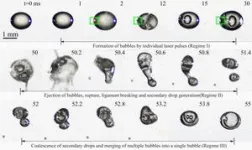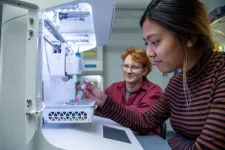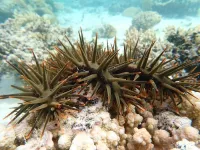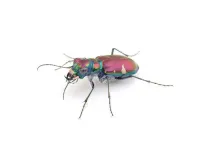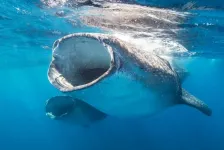Using AI to improve building energy use and comfort
New study from Waterloo researchers creating climate change-proof buildings with deep learning-powered inspections
2024-05-15
(Press-News.org)
University of Waterloo researchers have developed a new method that can lead to significant energy savings in buildings. The team identified 28 major heat loss regions in a multi-unit residential building with the most severe ones being at wall intersections and around windows. A potential energy savings of 25 per cent is expected if 70 per cent of the discovered regions are fixed.
Building enclosures rely on heat and moisture control to avoid significant energy loss due to airflow leakage, which makes buildings less comfortable and more costly to maintain. This problem will likely be compounded by climate change due to volatile temperature fluctuations. Since manual inspection is time-consuming and infrequently done due to a lack of trained personnel, energy inefficiency becomes a widespread problem for buildings.
Researchers at Waterloo, which is a leader in sustainability research and education and a catalyst forenvironmental innovation, solutions and talent, created an autonomous, real-time platform to make buildings more energy efficient. The platform combines artificial intelligence, infrared technology, and a mathematical model that quantifies heat flow to better identify areas of heat loss in buildings.
Using the new method, the researchers conducted an advanced study on a multi-unit residential building in the extreme climate of Canadian prairies, where elderly residents reported discomfort and higher electricity bills due to increased demand for heating in their units. Using AI tools, the team trained the program to examine thermal images in real time, achieving 81 percent accuracy in detecting regions of heat loss in the building envelope.
“The almost 10 per cent increase in accuracy with this AI-based model is impactful, as it enhances occupants’ comfort as well as reduces energy bills,” said Dr. Mohamad Araji, director of Waterloo’s Architectural Engineering Program and head of the Symbiosis Lab, an interdisciplinary group at the university that specializes in developing innovative building systems and building more environmentally friendly buildings.
The new AI tools helped to remove the element of human error in examining the results and increased the speed of getting the data analyzed by a factor of 12 compared to traditional building inspection methods.
Future expansions to this work will include utilizing drones equipped with cameras to inspect high-rise buildings.
“The hope is that our methodology can be used to analyze buildings and lead to millions in energy savings in a much faster way than previously possible,” Araji said.
More information about this work can be found in a research paper published recently by Energy Conversion and Management.
END
ELSE PRESS RELEASES FROM THIS DATE:
2024-05-15
Kyoto, Japan -- As global temperatures rise to record highs, the pressure to curb greenhouse gas emissions has intensified. Methane is particularly targeted because its significant global-warming potential in the short term exceeds carbon dioxide by over 80-fold.
However, monitoring methane emissions and compiling their quantities have been challenging due to limiting trade-offs with existing detection methods.
Now, a research team including Kyoto University and Geolabe, USA has developed a method to automatically detect methane emissions at a global ...
2024-05-15
DURHAM, N.H.—New Hampshire will boost its research leadership as an innovator in science and technology and increase its STEM workforce with investments across the state’s institutions of higher education, thanks to an $8 million grant to the University of New Hampshire from the National Science Foundation. The cooperative agreement award, one of just three of its type in the nation, aims to increase research opportunities, mentoring, training and partnerships between New Hampshire’s community colleges, four-year colleges and universities and industry.
“With this support, UNH will collaborate ...
2024-05-15
Even the most optimistic projections for the rapid build-out of solar, wind, and other low-carbon resources acknowledge that coal, natural gas, and other fossil fuels will dominate the world’s energy mix for decades to come. If the vast greenhouse gas emissions from burning these fossil fuels continue to enter the planet’s atmosphere, global warming will not be limited to sustainable levels. The capture and geologic sequestration of carbon emissions (CCS) offer a promising solution to the world’s carbon conundrum.
Even with growing technological maturity ...
2024-05-15
Scientists are one step closer to combatting coral-destroying crown-of-thorns starfish, following a University of Queensland study into the pest’s genetics.
In a world first study, University of Queensland PhD candidates Marie Morin and Mathias Jönsson analysed the genetics of the toxic coral-eating invertebrates found on the Great Barrier Reef.
“By understanding how crown-of-thorns (COTS) starfish genes work, we can unlock the mechanisms behind their key behaviours and find ways to stop them breeding,” Ms Morin said.
“In this study we looked at ...
2024-05-15
Bats, as the main predator of night-flying insects, create a selective pressure that has led many of their prey to evolve an early warning system of sorts: ears uniquely tuned to high-frequency bat echolocation. To date, scientists have found at least six orders of insects – including moths, beetles, crickets and grasshoppers – that have evolved ears capable of detecting ultrasound.
But tiger beetles take things a step further. When they hear a bat nearby, they respond with their own ultrasonic signal, and for the past 30 years, no one has known why.
“It’s ...
2024-05-15
UNDER STRICT EMBARGO UNTIL 19:01 EDT TUESDAY 14 MAY 2024
An undue focus on diagnosing dyslexia is leaving many children without the help they urgently need, according to two leading educational and clinical psychologists.
The experts are calling for educators, psychologists and policy makers to rethink approaches to assessment and support for children who are struggling to learn to read.
In a new book, Professors Julian Elliott (Durham University, UK) and Elena Grigorenko (University of Houston, USA) argue that the clinical diagnosis of dyslexia is not only scientifically questionable, but current procedures are failing to serve the needs of many struggling readers, particularly ...
2024-05-15
Researchers have found that heavily used shipping lanes pass through crucial whale shark feeding grounds, posing a threat to this endangered species.
Research published today (Wednesday 15 May) in Science of the Total Environment has revealed areas where the sharks are at the highest risk of colliding with large shipping vessels by mapping the locations of whale shark aggregations and overlaying them with information on shipping traffic.
“The almost ubiquitous overlap of at least some large shipping vessel traffic with whale shark aggregations underlines the magnitude of the threat the shipping industry ...
2024-05-15
A new study from the University of Hawaiʻi at Mānoa shows that chlorine mixed with petroleum in water can potentially produce inadvertent byproducts harmful to human health.
Small amounts of chlorine, within safe industry standards, are added to disinfect Oʻahu’s drinking water by the Honolulu Board of Water Supply (BWS) and military installations, according to BWS. In late November 2021, a petroleum release from the Red Hill Bulk Fuel Storage Facility contaminated the Red Hill ...
2024-05-15
(Memphis, Tenn. – May 14, 2024) Deaths from cancer or infections can occur when available treatments are ineffective. Once turned on, pregnane X receptor (PXR) activates the expression of genes encoding enzymes that metabolize external chemicals, including drugs. This causes a significant drop in the effectiveness of chemotherapy, antivirals and other pharmaceuticals. Blocking the PXR activity is notoriously difficult, as many drugs that bind the protein, whether intentionally or unintentionally, activate it. Scientists at St. Jude Children’s Research ...
2024-05-15
(Wednesday, 15 May 2024, Basel, Switzerland) New research, presented today at the 10th European Stroke Organisation Conference (ESOC) 2024, has revealed that high-income individuals have a 32% lower risk of post-stroke mortality.1 Additionally, those with a higher education have a 26% lower risk of death post-stroke, highlighting striking disparities in stroke survival based on key social determinants of health (SDoH).
The register-based study analysed data from 6,901 stroke patients in Gothenburg, Sweden between November 2014 to December 2019 to examine ...
LAST 30 PRESS RELEASES:
[Press-News.org] Using AI to improve building energy use and comfort
New study from Waterloo researchers creating climate change-proof buildings with deep learning-powered inspections

